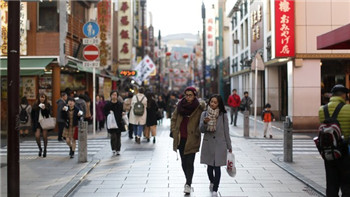(单词翻译:单击)

Japan’s economy shrank at an annualised rate of 1.4 per cent in the fourth quarter of 2015 in a further blow to Prime Minister Shinzo Abe and his Abenomics stimulus.
日本经济在2015年第四季度按年率计算收缩1.4%,这是对首相安倍晋三(Shinzo Abe)及其“安倍经济学”刺激措施的又一个打击。
Economists had forecast a fall of 1.2 per cent but the figure came in worse than expected because of a sharp decline in consumption.
此前经济学家们预计收缩1.2%,但由于消费急剧下降,实际数据逊于预期。
The data suggest Japan’s economy is still plagued by the weakness of domestic demand as it enters a fourth year of record monetary stimulus, with wages not rising fast enough to persuade consumers to spend.
该数据表明,进入创纪录货币刺激的第四个年头之际,日本经济仍受到内需疲弱的困扰,薪资增速不足以鼓励消费者支出。
There is no sign of a downward spiral in the economy but with the yen rising to trade at Y113.8 to the dollar in recent weeks, the figures put pressure on the Bank of Japan for even more monetary stimulus to encourage a strong round of wage rises this spring. Investors appear to expect more stimulus: the stock market rallied sharply after heavy falls last week, with the Nikkei 225 closing 7.16 per cent higher for one of its biggest one-day gains on record.
日本经济没有螺旋式下降的迹象,但随着最近几周日元汇率升至113.8日元兑1美元的水平,这些数据给日本央行(BOJ)带来压力,要求其出台更多货币刺激措施,鼓励今年春季出现一轮强劲的加薪。投资者似乎预计有更多的刺激措施:日本股市继上周暴跌之后大幅反弹,日经225指数(Nikkei 225)收盘上涨7.16%,创下有记录以来最大单日涨幅之一。
Yoshihide Suga, Japan’s chief cabinet secretary, blamed an exceptionally warm winter for the weakness of consumption. “The economic fundamentals are good,” he said. “We expect a steady recovery in business conditions.”
日本内阁官房长官菅义伟(Yoshihide Suga)将消费疲弱归咎于异常暖和的冬天。他说:“经济基本面还不错,我们预计商业状况稳步复苏。”
But Harumi Taguchi, principal economist at IHS Global Insight in Tokyo, said spending on cars and other durables was sluggish as well. “The bottom line is weak wage growth,” she said, arguing that consumers were saving to prepare for an anticipated rise in consumption tax next year. Ms Taguchi forecast growth would turn positive in the next quarter as the weather effect faded but would stay modest for most of the year.
但环球通视(IHS Global Insight)驻东京首席经济学家田口晴久(Harumi Taguchi)指出,在汽车和其他耐用品上的支出也很低迷。她表示,“关键问题是薪资增长疲弱。”她提出,消费者节省支出是为明年预期中的消费税上调做准备。田口晴久预计,随着天气影响减弱,增长将在下一季度转为正数,但将在今年大部分时间里维持温和增长。
In a sign of how badly Abenomics has struggled, growth for the full year of 2015 was 0.4 per cent, following a year of zero growth in 2014. That is roughly in line with Japan’s long-run growth potential, suggesting little progress towards using up spare capacity in the economy, essential to driving inflation upwards.
在2014年零增长之后,日本经济在2015年全年增长0.4%,这表明安倍经济学多么岌岌可危。这大致符合日本长期增长潜力,似乎表明在充分利用经济闲置产能(这对推高通胀不可或缺)方面进展甚微。


